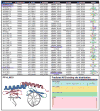The Apicomplexan AP2 family: integral factors regulating Plasmodium development
- PMID: 21126543
- PMCID: PMC3026892
- DOI: 10.1016/j.molbiopara.2010.11.014
The Apicomplexan AP2 family: integral factors regulating Plasmodium development
Abstract
Malaria is caused by protozoan parasites of the genus Plasmodium and involves infection of multiple hosts and cell types during the course of an infection. To complete its complex life cycle the parasite requires strict control of gene regulation for survival and successful propagation. Thus far, the Apicomplexan AP2 (ApiAP2) family of DNA-binding proteins is the sole family of proteins to have surfaced as candidate transcription factors in all apicomplexan species. Work from several laboratories is beginning to shed light on how the ApiAP2 proteins from Plasmodium spp. contribute to the regulation of gene expression at various stages of parasite development. Here we highlight recent progress toward understanding the role of Plasmodium ApiAP2 proteins in DNA related regulatory processes including transcriptional regulation and gene silencing.
Copyright © 2010 Elsevier B.V. All rights reserved.
Figures

References
-
- Le Roch KG, Zhou Y, Blair PL, Grainger M, Moch JK, Haynes JD, et al. Discovery of gene function by expression profiling of the malaria parasite life cycle. Science. 2003;301:1503–8. - PubMed
-
- Lopez-Rubio JJ, Mancio-Silva L, Scherf A. Genome-wide analysis of heterochromatin associates clonally variant gene regulation with perinuclear repressive centers in malaria parasites. Cell Host Microbe. 2009;5:179–90. - PubMed
Publication types
MeSH terms
Substances
Grants and funding
LinkOut - more resources
Full Text Sources
Research Materials
Miscellaneous

